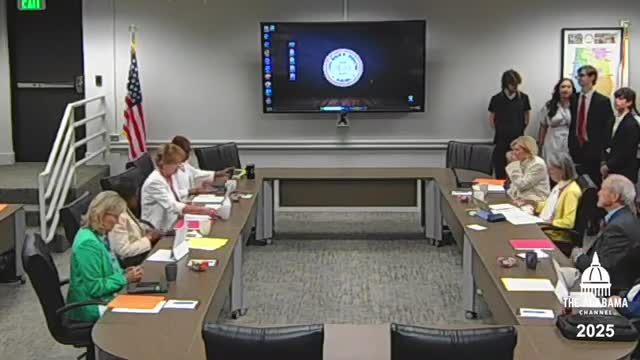Student advocates tell state education officials mental-health, curriculum and counseling gaps persist
October 18, 2025 | Alabama State Department of Education, State Agencies, Executive, Alabama
This article was created by AI summarizing key points discussed. AI makes mistakes, so for full details and context, please refer to the video of the full meeting. Please report any errors so we can fix them. Report an error »

A group of high school students from the statewide A+ Student Voices initiative told the Alabama State Department of Education at its June work session that mental health, counseling access and curriculum relevance are top concerns for classmates across the state.
The students, who surveyed peers and developed recommendations for legislators and the State Board, said the pressure to know a college or career path early and heavy workloads are drivers of stress. “One thing that a lot of students struggle with is the pressure to know exactly what they're going to do out of college,” said Micaiah McDaniel, an A+ Student Voices member who identified herself as working on the group’s mental‑health survey. She added students feel constrained from exploring majors and interests because of perceived pressure to pick a path.
Why it matters: Board members and staff said student testimony helps shape policy and curriculum decisions. The students’ concerns align with state work on counseling and a new tele‑mental‑health program authorized by the legislature that department staff said will roll out in 2026.
Students detailed three recurring themes from their year‑long advocacy and survey work: heavy coursework and late‑night assignments that push some students into chronic burnout; lack of counseling resources or lack of awareness about existing counseling; and curriculum that students say often fails to teach applicable life skills such as tax filing or practical financial literacy.
“I think when a curriculum is rigorous but it crosses the line and goes from rigorous to just plain stressful, you start to miss things because the workload is so stressful,” said Annie Ledpana, an A+ Student Voices member who participated in the mental‑health portion of the survey. Another student, speaking about counselor availability, noted that while some districts have a mental‑health coordinator, “they have problems connecting people to resources even when they are there.”
Students also urged more diverse instructional methods and project‑based learning. “If we taught things in more diverse ways instead of just lecture based … we could really understand the curriculum instead of just trying to get through assignments,” said another participant, who described herself as a visual learner.
Board response and next steps: State education officials thanked the students and said the legislature’s new tele‑mental‑health program — which the department was directed to lead — may help expand services. Department staff said the program is in early development and expected to begin in 2026. Officials also invited the students to continue engagement during the afternoon work session.
Ending: The students left board members with concrete asks — more counselor capacity, earlier pathways for career exploration that still allow flexibility, and curriculum changes that emphasize workload management and life skills.
The students, who surveyed peers and developed recommendations for legislators and the State Board, said the pressure to know a college or career path early and heavy workloads are drivers of stress. “One thing that a lot of students struggle with is the pressure to know exactly what they're going to do out of college,” said Micaiah McDaniel, an A+ Student Voices member who identified herself as working on the group’s mental‑health survey. She added students feel constrained from exploring majors and interests because of perceived pressure to pick a path.
Why it matters: Board members and staff said student testimony helps shape policy and curriculum decisions. The students’ concerns align with state work on counseling and a new tele‑mental‑health program authorized by the legislature that department staff said will roll out in 2026.
Students detailed three recurring themes from their year‑long advocacy and survey work: heavy coursework and late‑night assignments that push some students into chronic burnout; lack of counseling resources or lack of awareness about existing counseling; and curriculum that students say often fails to teach applicable life skills such as tax filing or practical financial literacy.
“I think when a curriculum is rigorous but it crosses the line and goes from rigorous to just plain stressful, you start to miss things because the workload is so stressful,” said Annie Ledpana, an A+ Student Voices member who participated in the mental‑health portion of the survey. Another student, speaking about counselor availability, noted that while some districts have a mental‑health coordinator, “they have problems connecting people to resources even when they are there.”
Students also urged more diverse instructional methods and project‑based learning. “If we taught things in more diverse ways instead of just lecture based … we could really understand the curriculum instead of just trying to get through assignments,” said another participant, who described herself as a visual learner.
Board response and next steps: State education officials thanked the students and said the legislature’s new tele‑mental‑health program — which the department was directed to lead — may help expand services. Department staff said the program is in early development and expected to begin in 2026. Officials also invited the students to continue engagement during the afternoon work session.
Ending: The students left board members with concrete asks — more counselor capacity, earlier pathways for career exploration that still allow flexibility, and curriculum changes that emphasize workload management and life skills.
View full meeting
This article is based on a recent meeting—watch the full video and explore the complete transcript for deeper insights into the discussion.
View full meeting
